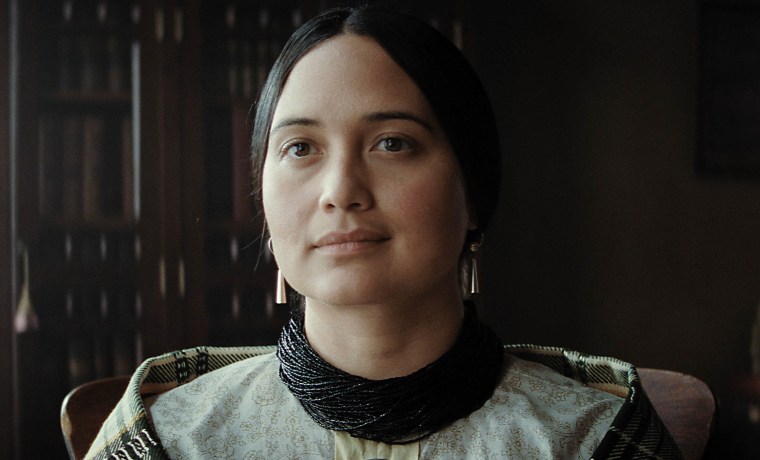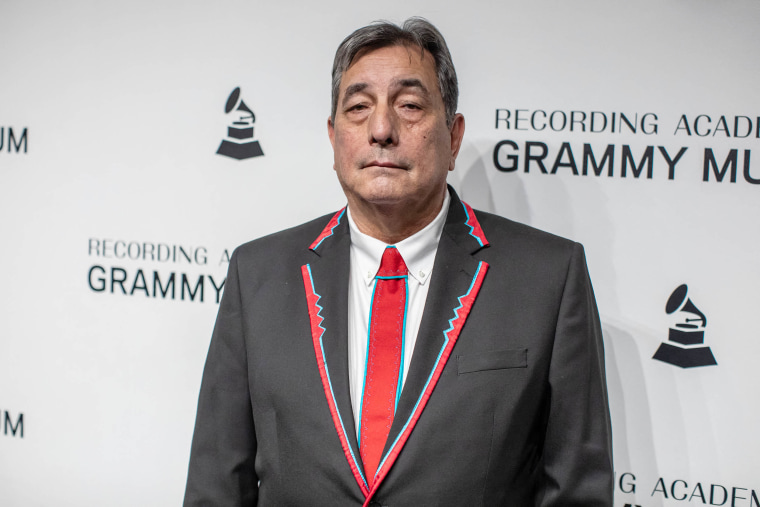“Killers of the Flower Moon” star and Indigenous performer Lily Gladstone is describing how moved she felt watching Osage Nation singers perform onstage at the 2024 Oscars.
The singers performed at the event March 10 with Osage songwriter Scott George, who wrote best original song nominee “Wahzhazhe (A Song For My People).” The nomination marked the first time an Osage writer notched a nod in the category.
The song ultimately lost the Oscar to “What Was I Made For” from “Barbie,” but Gladstone said March 12 on X, formerly Twitter, that seeing Osage singers perform was a win for representation.
"When watching the Osage Singers at the Oscars, my inner voice said 'They’re the ones bringing us all up on stage tonight, that’s how it should be,'" she wrote. "The history in the film and of the moment rightfully belong to the Osage Nation. What an honor to be close enough to feel the drum."
"Killers of the Flower Moon" had 10 Academy Award nominations, including best picture, best actress and best director, and depicts a harrowing moment in American history when dozens of members of the Osage tribe met violent or suspicious ends following the discovery of oil on their Oklahoma land. Though it did not take home any Oscar wins, Gladstone was a favorite for the best actress award and fans consider it an upset. The award went to Emma Stone for "Poor Things."
Read on for everything to know about Oscar-nominated song "Wahzhazhe (A Song For My People)."

When does 'Wahzhazhe (A Song For My People)' appear in 'Killers of the Flower Moon'?
The song plays at the end of the movie during a scene depicting the community gathering for a ceremony after the horrific events that unfolded.
After attending Osage Inlonshka ceremonial dances, director Martin Scorsese wanted the movie to conclude with a piece of Osage music, he told AppleTV+. Scott George wrote this song specifically for the film “to express his feelings about being an Osage,” Scorsese said.
“By the end of the film we had to have some sense of the presence of the Osage. They survive. The music of the Osage is the best display of this extraordinary survival,” Scorsese told AppleTV+.
How 'Wahzhazhe (A Song For My People)' came to be
Osage musician Scott George, who also served as a music consultant for the film, told Variety he wasn't sure whether to say yes to writing an original song.
“A lot of people get invited to our dances to just look on and see what we do," he said. "But they are ceremonials, and we don’t like for them to be filmed, or recorded. We were afraid our people would say, ‘We don’t want anybody to see that.’”
George was swayed once he learned where the song would play in the movie and how it would be used, he told Variety.

While George said he had around 400 ceremonial compositions to draw inspiration from, he decided on an original composition as most of the existing songs have connections to many specific individuals and communities.
What do the lyrics of 'Wahzhazhe (A Song For My People)' mean?
George told The Osage News the Osage language lyrics translate to “stand up" and “God made it for us," repeated again and again.
The musician said the message he was trying to convey went beyond the lyrics: He hoped to capture the pride and strength behind the Osage Nation.
"In reality, my thoughts behind it are we’ve gone through all this, and this is showing what we’ve gone through, this movie — what our people went through, and still go through today, in some form or another," George told The Osage News. "So, I’m asking our people to stand up, basically, and be proud of the fact that God created a way for us."
